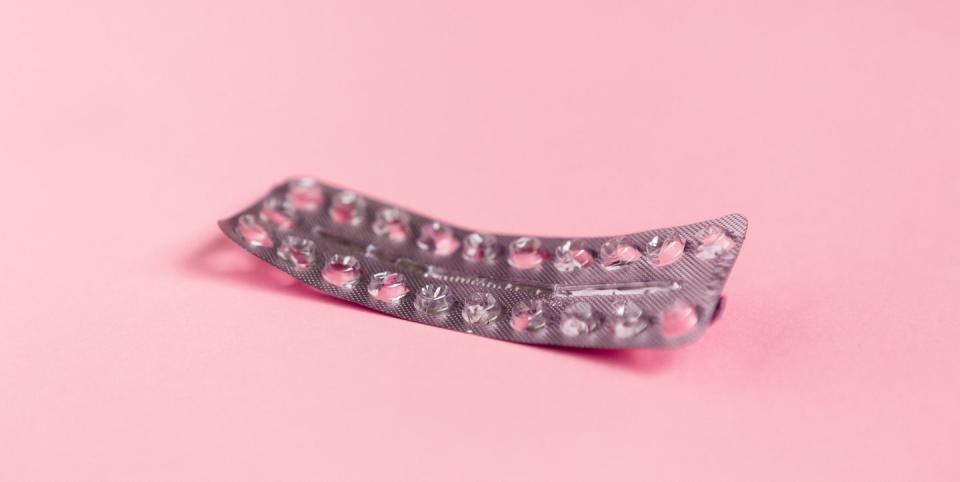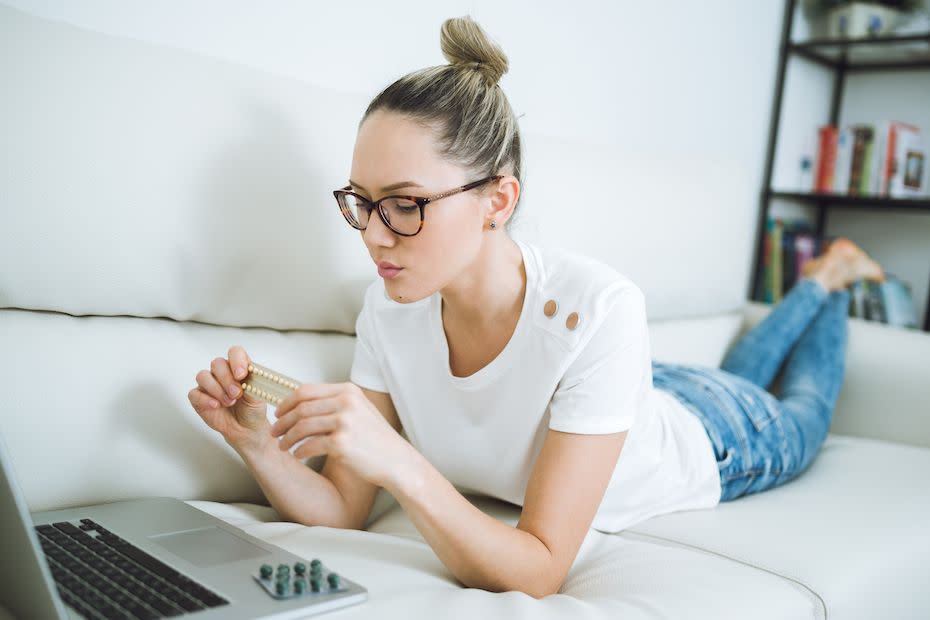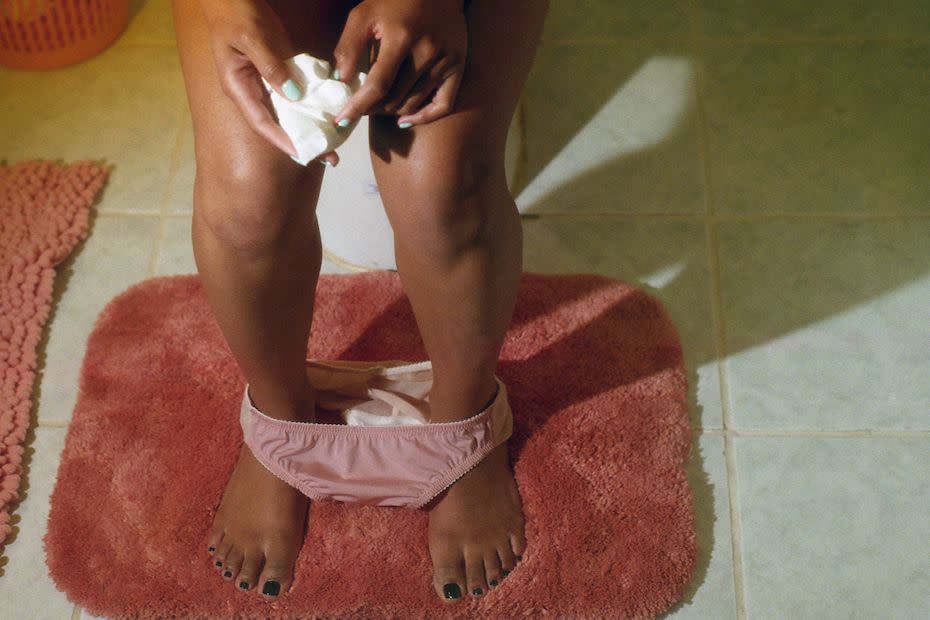Erm, so do you actually need to take a break on the contraceptive pill?

If your contraception of choice is the pill, the chances are you've probably considered taking the pill back to back to avoid having a period – whether that's because you're heading on holiday or you simply don't wanna deal with Aunt Flo.
But how does this actually impact our bodies? Well – contrary to what many of us have always believed – it turns out, it doesn't. In fact, guidelines from the Faculty of Sexual and Reproductive Health (FSRH) state that there is no health benefit associated with taking the seven-day hormone-free interval that's so commonplace on the combined pill.
According to the guidelines, which were accredited by the National Institute for Health and Care Excellence (NICE): "Women can safely take fewer (or no) hormone-free intervals to avoid monthly bleeds, cramps and other symptoms."
The FSRH also suggests that if users of the combined pill still wish to take a hormone-free interval in their cycle, "shortening it to four days could potentially reduce the risk of pregnancy."
These guidelines echo advice Cosmopolitan UK previously sought from a doctor on the whole 'is it safe to double back your pill?' debacle. Here, Dr Seth Rankin of The London Doctors Clinic, explains everything you need to know about taking – or not taking – a break on the pill...
What happens when you take the pill back to back?
"The effects of the pill generally only last 24-hours. That's why you need to take it every day, and not once a week, for example, since the body breaks down the hormones on a daily basis," explains Dr Rankin. "Therefore, there's no significant cumulative effect of taking the pill: no build-up of hormones after over 21 days' tablets."

Taking the pill back to back: side effects
Fertility
"There is no evidence to suggest that long-term fertility is affected by continued use of the pill," says Dr Rankin. "In fact, fertility bounces back very quickly after the 7 pill-free days, hence why unplanned pregnancies often occur after a prolonged pill-free period."
Skin
"Higher oestrogen levels have a positive effect on skin, and are often used to treat conditions such as acne in women. Oestrogen stimulates the production of hyaluronic acid, which enables the skin to stay well moisturised, smooth and soft," Dr Rankin notes.
"In fact, a recent study in to the effects of 'extended cycle use', in which 625 women took 4 packs of the oral contraceptive pill back to back (84 pills in total) showed a decrease in skin problems."
Hair
"Sex hormones, such as oestrogen, are known for having a great effect on hair, promoting healthy hair growth. That's why in some cases the oral contraceptive pill can also be used to help with alopecia. Post-menopause, women have lower levels of oestrogen, which can lead to gradual hair thinning," Dr Rankin tells us.
"Conversely, pregnant women have much higher levels of oestrogen than normal, often resulting in hair that is both thicker and stronger. After all, it's the least Mother Nature can do to make up for the many downsides of pregnancy: stretch marks, swollen ankles, extreme tiredness etc… So theoretically, an extended cycle of these hormones in the pill would likely have a positive effect on hair, although this has not been extensively researched to date."
Mood
"There's no denying the effect hormonal contraceptives have on women's moods! And the more sex hormones in your blood, the more effect on your mood. Different packs of the oral contraceptive pill have different doses of oestrogen and progesterone – a discussion that your doctor will likely have with you. The higher the dose, the more the side-effects, good and bad. Some women will experience better hair and skin, but worse mood swings, weight gain etc. It's all just swings and roundabouts," Dr Rankin explains.
"Having said that, some women taking the pill report symptoms of hormone withdrawal during the seven pill-free days of the traditional 28 days cycle most women conform to. So by this logic, longer cycles might keep these withdrawal episodes to a minimum."
Weight
"The implication of the pill being responsible for women putting on weight is a controversial one, with some doctors arguing that women would most likely gradually put weight on anyway over the years," Dr Rankin tells us. "Although many women do experience an increase in weight due to the pill, it's also hard to narrow down whether this is directly due to the pill, or secondary to the effects the pill has on women's moods."
He goes on: "There is no evidence to suggest that taking consecutive packs of pills increases weight change."

And what happens to the womb lining when you don't let yourself have a period on the pill?
"The pill contains two hormones: oestrogen and progesterone. If you can think back to year 9 science, you'll remember that the role of progesterone in the menstrual cycle is to thicken the lining of the womb," Dr Rankin points out.
"So, if you've take twice as many pills (6 weeks' worth instead of 3) since your last period, you'd assume the womb to be twice as thick, resulting in a heavier period, no? Actually, in reality it doesn't seem that simple, with little evidence found to correlate the number of consecutive pills taken with the heaviness of the withdrawal bleed. Some women may experience heavier bleeding after a longer cycle, others may not."
So, is it safe to take the pill back to back?
"The most significant risk of taking the pill is the risk of developing blood clots, leading to deep vein thromboses (DVT), which can break off and travel to the lungs or brain, resulting in pulmonary embolism or stroke, respectively," Dr Rankin notes.
"There has been extensive research into any link between prolonged pill cycles and the increased risk of blood clots. Multiple studies measuring equal risk of blood clots between the traditional 21/7 day pill cycle vs a 91-day pill regimen have found no change in blood clot risk whether you take the pill in one, two or 3 month cycles."
What about continuous pill taking for months?
"The NHS warns against taking multiple packs of the combined oral contraceptive pill back to back; not specifically on the grounds of it being unsafe, but because of the chances of breakthrough bleeding (spotting) or side-effects such as bloating," Dr Rankin says.
"However, conversely, doctors actually recommend continuous use of oral contraceptives for treatment of conditions such as endometriosis, as well as to ease heavy or painful periods.
"Evolutionarily, our female ancestors would have far fewer menstrual cycles than the average modern woman, as the former would spend most of her life either pregnant or breastfeeding. So women don't need a period every month to stay healthy. Perhaps it's just a welcoming reassurance of the absence of pregnancy. But in this modern day and age, this reassurance can also be gained by means of £2.99 pregnancy tests from your nearest pharmacy!"

So all in all, straight from the doctor's mouth (and the FSRH, too), it doesn't seem like there is any evidence to suggest danger or disadvantage from taking back-to-back packs of pills. Essentially, it's up to you how frequently you want your periods...
Tune into Davina McCall's Pill Revolution on Channel 4 on 8 June for more myth busting on the contraceptive pill.
This article is not intended to be a substitute for professional medical advice or diagnosis. Always seek the advice of your physician or other qualified health provider with any questions you may have regarding a medical condition.
You Might Also Like

